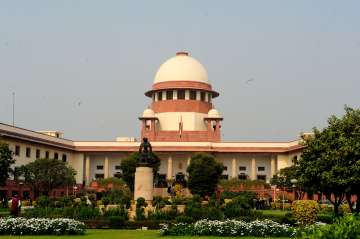The candid admission of an activist seeking a blanket order to remove encroachments in the country and saying he has never cast his vote did not go down well with the Supreme Court which observed that people have "no right" to question or blame the government if they do not cast their vote.
“One can't blame the government for everything. If a person does not cast his vote, then he has no right to question the government," an apex court bench headed by Chief Justice J S Khehar said while hearing a plea seeking order on encroachments.
The court observed that it cannot pass a sweeping order on encroachments in a matter involving all states.
The bench, which also comprised Justices N V Ramana and D Y Chandrachud, said it was not possible for it to look into encroachments sitting in Delhi and asked the petitioner to approach different High Courts wherever he saw such encroachments on roads or pavements.
The hard-hitting observation came when Dhanesh Ieshdhan, appearing in person for Delhi-based NGO 'Voice of India', said the governments do not do anything to remove encroachments and kept on insisting for a blanket order to remove them from across the country.
The bench asked Ieshdhan whether he has voted or not.
"To be honest, I have never voted in my life," Ieshdhan said candidly.
This irked the bench which said, "If you have not voted, then you have no right to question or blame the government".
"We do not have so much power to order a clean sweep of encroachments. If we pass any order, then contempt cases and other petitions will pile up. It's not possible," the bench said after the petitioner kept on seeking a blanket order.
"If you do not move High Courts, we will feel that you are here for publicity," the bench said and noted in the order that an open-ended direction to remove encroachments will not serve any purpose.
It granted liberty to the NGO to seek remedy state-wise before the High Courts.
On August 26 last year, the apex court, while hearing the plea, had said it cannot order the establishment of 'Ram Rajya' in the country and cannot do several things it wanted to due to its "limited capacity".
"Do you think with our directions, everything will be done? Do you (petitioner) think we will pass an order that there will be no corruption in the country and all corruption will go? Should we pass an order that there will be 'Ram Rajya' in the country? It cannot be like this," the apex court had then observed.
The NGO had said that in 2014, the apex court had asked concerned authorities to deal with the issue raised it its plea.
(With PTI inputs)
Latest India News

